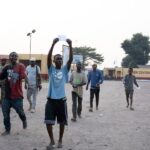Before the sun had even set in Queens on Friday night, faced a dilemma.
It was the third inning of . His club was facing an early, but hardly insurmountable, two-run deficit. And with starting pitcher lacking both command and fastball velocity, Roberts had three fraught options before him.
1. Stick with Flaherty, and hope he could settle down.
2. Summon a lower-leverage arm like Brent Honeywell Jr. or Landon Knack (or at least have them warming up if things got dire), and hope they could hold the deficit.
3. Turn to a high-leverage reliever immediately, and risk wasting valuable bullets with a likely bullpen game looming in Game 6.
When you lack reliable starting pitching in the playoffs, these are sometimes the choices you’re left with.
And just like in Game 2, Roberts opted for the conservative path, leaving Flaherty in the game — and watching in horror at what happened.
In a six-batter sequence, the Mets exploded for a five-run rally, opening up a seven-run lead they would nurse the rest of the way for a . On a night the Dodgers could have ended the NLCS and booked a place in next week’s World Series, they instead let this best-of-seven head back to Los Angeles.
The Dodgers still have the inside track to reach the Fall Classic. They lead the series 3-2, needing just one more victory with two tries at home to get it.
All week, plastic tarps had been taped to the ceiling of the visiting clubhouse at Citi Field. The Dodgers came and went without them being unfurled in celebration.
What was clear from the start of Friday’s game was Flaherty’s lack of stuff. In a three-run first inning, his fastball was sitting around 91 mph, well below his 93.3 mph season average. His command wasn’t there either, leading to two walks in a frame punctuated by a three-run blast.
Despite a leadoff double from Francisco Alvarez in the bottom of the second and two near-homers from later in the inning (one that went just foul, the other that died at the warning track), Flaherty did retire the side unscathed. The Dodgers, meanwhile, got one run back against Mets starter David Peterson, making the score 3-1 entering the third.
Thus, Roberts faced his fateful decision.
Ever since the Dodgers acquired Flaherty at the trade deadline, the veteran right-hander has been their de facto — or, at least, by default — ace.
It’s not what the Dodgers envisioned at the start of this season, back when they thought (who had a season-ending elbow injury) and (who entered the playoffs only weeks removed from a three-month shoulder injury) could carry their rotation.
But, it’s nonetheless the position they found themselves in.
So, Roberts elected to leave him in the game.
Flaherty got two quick strikes on Alonso, but then missed the zone four straight times for a leadoff walk. Four more consecutive balls to Jesse Winker put another runner on base, and brought pitching coach Mark Prior out of the dugout.
In the bullpen left-hander Anthony Banda began to get warm.
Before the Dodgers could get to him, however, the game quickly got away from them.
Starling Marte lined a double down the line to drive home two runs. Alvarez, Lindor and Brandon Nimmo recorded three more RBIs on two-out hits.
In the midst of it all, Banda sat back down. Rather than get aggressive with his all-important bullpen, Roberts decided to let Flaherty wear it.
While it was an unpopular decision to some factions of the Dodgers fan base, Roberts didn’t act — or, more accurately, not act — without reason.
Similar to Game 2, he prioritized the long-term workload of his bullpen — which will now play a critical role in whatever remains of this series — over the slim, but very much realistic chances of his offense rallying for a win.
The Dodgers didn’t roll completely over. Andy Pages hit two home runs in the fourth (a solo shot) and fifth (a three-run blast) to keep the Dodgers within striking distance. Mookie Betts then went deep in the sixth, making the score 10-6.
But the Dodgers would get no closer, always failing to gain enough comeback traction as Honeywell surrendered four runs in 4⅔ valiant but ineffective innings of relief.










